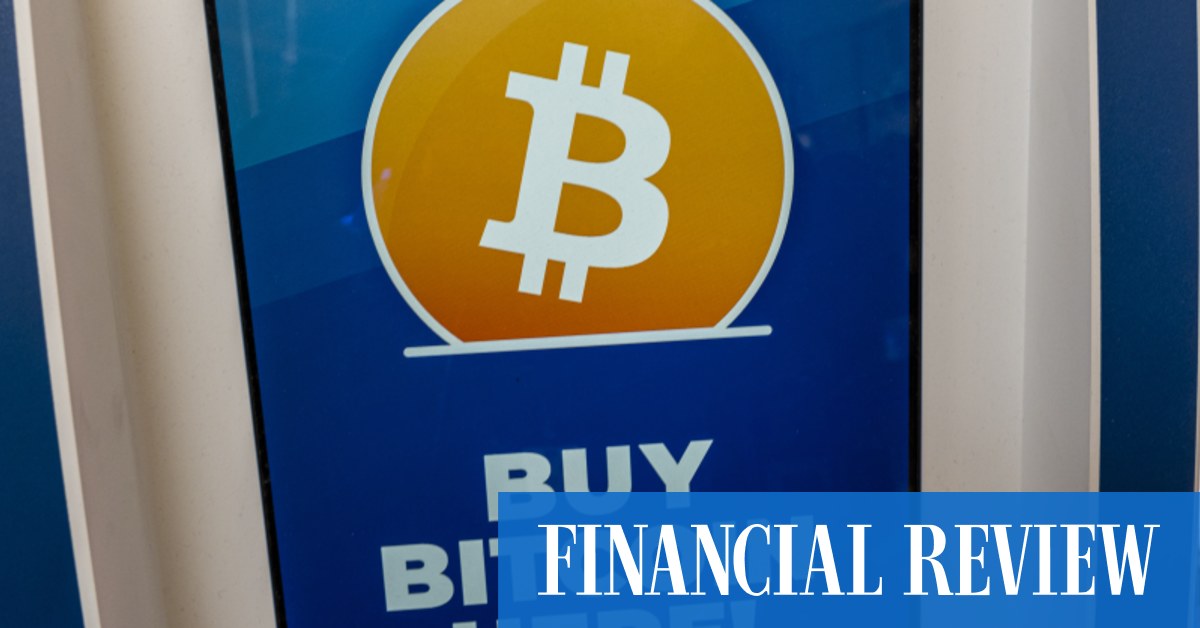Australians now have huge choice when it comes to deciding whether they want to trade through a local cryptocurrency exchange or to choose an international platform.
Many perform the same function with similar security features, though some Australians prefer trading through local businesses.
A cryptocurrency ATM in San Francisco. Investors have a choice of local and international exchanges while buying crypto. Bloomberg
After the famous hacking of Mt Gox exchange in 2014, security is a key issue to protect users’ crytpocurrency. In the largest bitcoin hack to date, cyber criminals stole 740,000 bitcoins from Mt Gox customers in 2014 and stole 100,000 from the company itself, then worth about $US460 million.
Managing director of comparison website Finty, Andrew Boyd, says that exchanges are first and foremost concerned with security, and most have similar features.
“Exchanges – local and international – are acutely aware of the importance of security and the negative impact a breach can have on their brand and reputation. Two-factor authentication [2FA] is widely used to secure the user’s account,” says Boyd.
“Where an exchange does not require 2FA by default, they often restrict the account functionality so that funds cannot be transferred out without 2FA being configured. Digital Surge, for example, operates in this way. Exchanges also use machine learning and artificial intelligence to detect anomalous or fraudulent activity.
“They all do essentially the same thing. But for Aussies looking to buy larger amounts of crypto or invest in crypto for their self-managed superannuation fund, dealing with a local exchange is particularly reassuring for both credibility, security, and customer service.
We recommend a two-step verification process for any fiat or digital currency withdrawal.
— Jess Renden, Cointree
“It’s quite common now for custodial exchanges to hold a large percentage of crypto assets in cold storage. In some jurisdictions, particularly Canada, it’s commonplace for exchanges to have insurance on crypto assets held in custody. This is not the case in Australia, yet.”
Jess Renden, chief operating officer of Australian crypto exchange Cointree, says the security of the platform should be a key priority for investors.
“We recommend a two-step verification process for any fiat or digital currency withdrawal, that application credentials are kept separate from the database and codebase to mitigate the damage of a security breach, and all website traffic must run over an encrypted Secure Sockets Layer [SSL],” she says.
“Investors must also check any reporting on the exchange domestically and in the exchange’s home market to determine if they have been involved in past allegations or if there have been any investors on the platform that have been burned and gone public. This is a good sign that the exchange is not putting the interests of its investors first.”
Boyd sees a strong preference on Finty.com for local crypto exchanges among Australians despite all the major international exchanges – Binance, Coinbase, Gemini – being active in the market.
Local exchange Swyftx is often compared to the world’s biggest exchange, Binance. According to Finty, both are popular and both provide reliable services to Australian investors and traders.
But the overall verdict from Finty is that Swyftx “offers low trading fees, robust trading features, and an excellent mobile application”.
With live chat and an integrated licence and tax system, Swyftx is ideal for Australians who want to trade without giving up too much in fees and spreads or worrying about the logistics or tax implications behind their transactions when they make withdrawals.”
James Glennon of CryptoRanking.com.au has also compared Swyftx and Binance and concludes: “Swyftx, apart from being the exchange with the lowest fees in Australia, is also reputed as one designed with newbies in mind. This means that its user interface is so simple that someone entering the space for the first time can navigate it successfully.
“Although it is not really a bad thing, Binance is more suited for more advanced users of crypto. The user interface is quite easy for more experienced users but for a new user, it can be a little bit confusing,” Glennon says.
Ryan Parsons, chief executive of Swyftx, says one advantage of going international, for the moment anyway, is that some larger global exchanges have already developed more sophisticated institutional offerings.
“But from a retail point of view, you’re not going to experience any real price or liquidity advantage whether you choose to buy an asset through an Australian or international exchange. This is just the reality of trading in an open and global market,” he says.
“Where Australian exchanges do have a genuine advantage is across areas like service and speed. Customer experience is paramount and domestic exchanges have faster integration for dollar deposits and withdrawals. They also have a more tailored approach to customer support.”
In addition, if cryptocurrency trading comes under heavier local regulation, there is a risk that international platforms could abandon Australia.
“It’s a trend we’re currently seeing in the United Kingdom, where more than 60 firms have either withdrawn their applications to the country’s Financial Conduct Authority, or else their applications have been flat out rejected.
“All of which plays into wider concerns people may have about blockchain businesses that look like they’re everywhere but cannot be tied to any particular jurisdiction.”
Follow the topics, people and companies that matter to you.
Fetching latest articles
The Daily Habit of Successful People
Author
Administraroot


